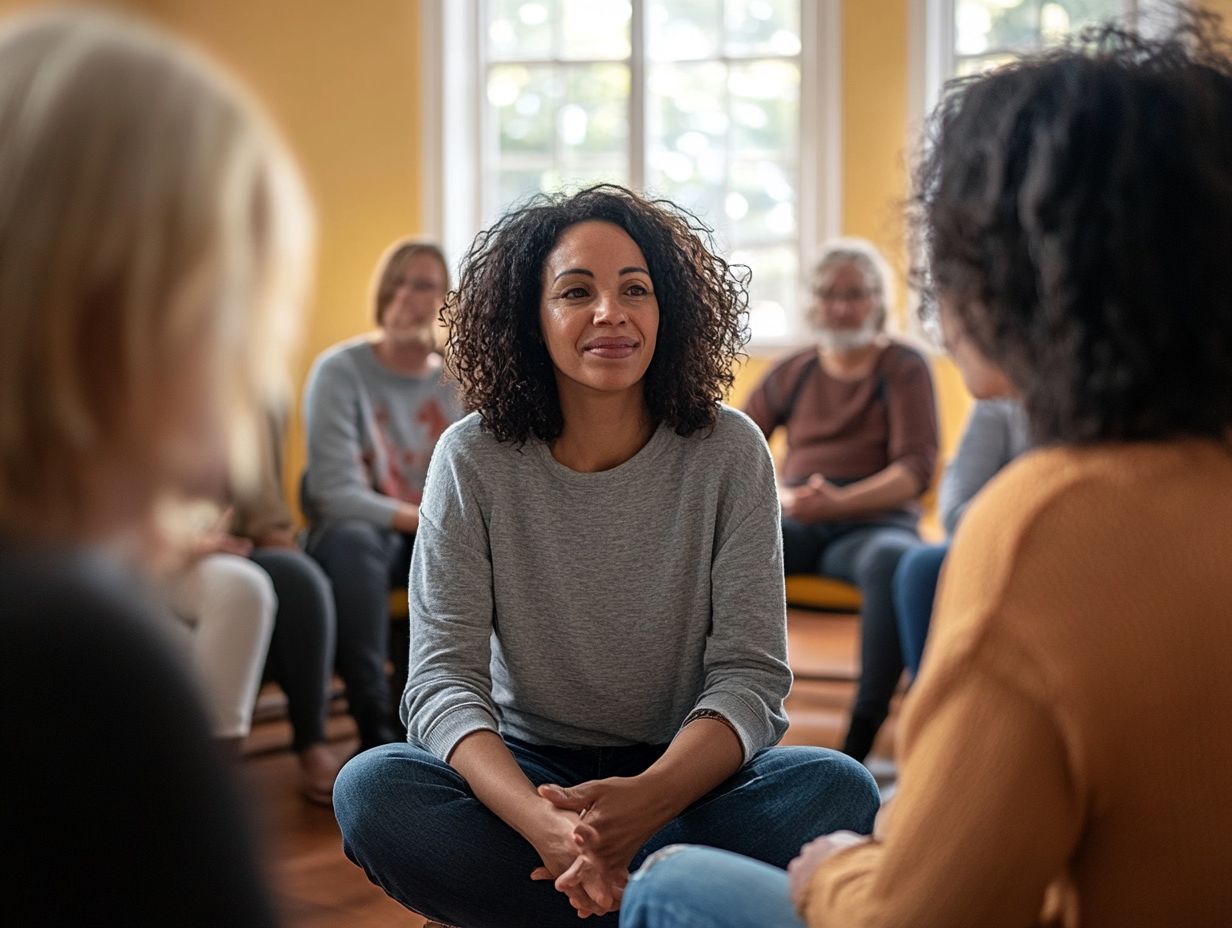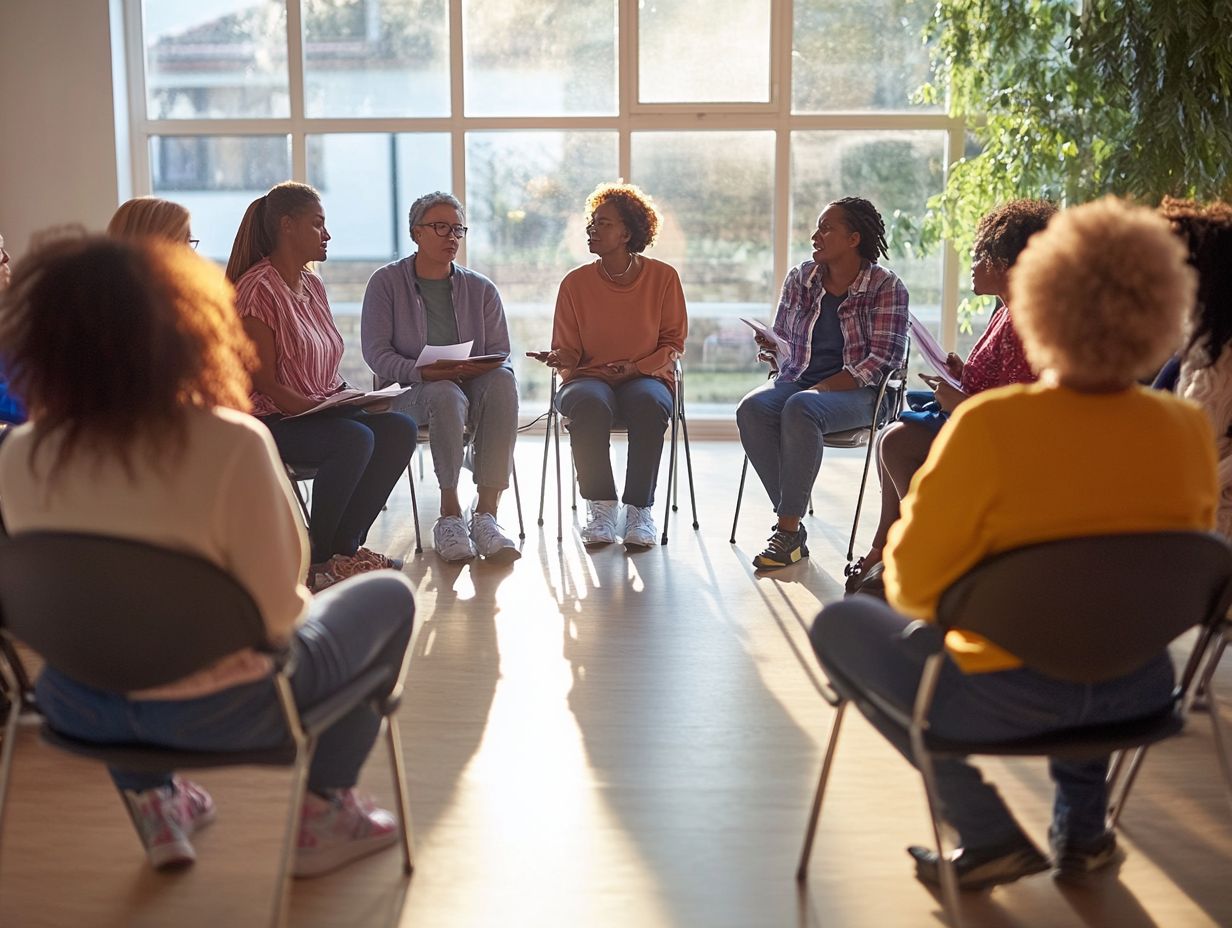Caring for a loved one with cancer can be both emotionally and physically challenging, making support groups a valuable resource for caregivers. These groups provide essential emotional support, coping strategies, and community connections, helping caregivers manage stress and reduce feelings of isolation.
Some of the best support groups for cancer caregivers include:
- American Cancer Society: Offers online support, transportation services, and community programs.
- Cancer Support Community: Provides resources and groups for guidance through all stages of cancer.
- Family Caregiver Alliance: Focuses on emotional support and training for effective caregiving.
- National Alliance for Caregiving: Develops educational resources to enhance caregiver skills.
- CancerCare: Offers financial assistance and hosts online support groups.
Joining a support group can enhance caregivers’ abilities, boost resilience, and provide a network for sharing experiences and advice.
Key Takeaways:
1. American Cancer Society

The American Cancer Society (ACS) provides resources, support, and services to cancer patients and their families in the United States.
ACS offers online support groups, caregiver support, transportation services to treatments, and the Look Good Feel Better program to enhance patients’ self-esteem.
More than 1.5 million cancer patients benefit from ACS programs annually, improving mental health and reducing isolation.
2. Cancer Support Community
Cancer Support Community (CSC) provides patient support groups and resources for cancer patients and their families.
CSC support groups offer guidance during diagnosis, treatment, and survivorship.
Participants share experiences and coping strategies to reduce isolation in cancer journeys.
Access CSC resources online or contact local chapters for program information and information about wellness programs.
3. Family Caregiver Alliance
The Family Caregiver Alliance (FCA) provides support and resources for family caregivers, including specialized support groups and training sessions.
FCA’s support groups offer emotional support and coping skills, while training sessions cover topics like stress management and effective communication.
These resources help caregivers manage their roles and connect with others facing similar challenges, including those with metastatic cancer support needs.
4. National Alliance for Caregiving
The National Alliance for Caregiving (NAC) improves caregiver quality of life through advocacy, education, and research.
NAC develops initiatives to provide caregivers with tools and resources to manage caregiving tasks effectively.
The organization offers training programs and educational resources to enhance caregiver skills and confidence.
NAC fosters emotional well-being and creates community support networks for caregivers.
5. CancerCare
CancerCare is a non-profit organization that provides financial assistance and emotional support to cancer patients and families.
CancerCare offers financial aid for medical bills and everyday expenses and hosts online support groups for community support.
CancerCare helps patients focus on recovery by reducing financial and emotional stress.
CancerCare also offers a special program called Healing with Words which offers emotional and therapeutic support through writing.
Additionally, CancerCare’s programs are inclusive, providing specialized LGBTQ+ cancer support.
6. Well Spouse Association
The Well Spouse Association supports partners of individuals with chronic illnesses by offering caregiver support groups and resources.
These programs provide emotional support, coping skills, and community engagement for caregivers facing similar challenges.
7. Caregiver Action Network

The Caregiver Action Network (CAN) supports caregivers by providing resources, guidance, and coping skills.
CAN offers online tools, educational materials, and support networks for caregivers to manage caregiving challenges.
CAN enables caregivers by fostering community connections and offering practical advice through its various online support groups.
8. Cancer Hope Network
Cancer Hope Network provides emotional support to cancer patients and families by connecting them with trained volunteers who share similar experiences.
Volunteers are matched based on patients’ specific treatment types and emotional needs.
Support helps patients navigate their cancer journey and promotes enablement and resilience.
9. National Family Caregivers Association
The National Family Caregivers Association (NFCA) supports family caregivers by providing resources and emotional support.
NFCA offers caregiver training programs, informational webinars, and a library of articles on caregiving challenges.
NFCA emphasizes connecting caregivers for emotional support and community engagement.
10. Leukemia & Lymphoma Society
The Leukemia & Lymphoma Society (LLS) supports patients with blood cancers by providing emotional support, educational resources, and access to community programs.
LLS offers support groups and an Information Resource Center for personalized assistance and up-to-date information on diagnosis and treatment.
Community initiatives by LLS help connect patients and families, fostering a supportive network.
11. National Hospice and Palliative Care Organization
The National Hospice and Palliative Care Organization (NHPCO) advocates for comprehensive care and emotional support for terminally ill patients and their families.
NHPCO provides caregiver training, creates support networks, and emphasizes emotional resources for holistic end-of-life care.
12. Gilda’s Club
Gilda’s Club provides support groups for cancer patients and their families, offering emotional support and community connections.
Support groups cater to different demographics, including:
- women
- men
- young adults
- children
Participants find community and encouragement through shared experiences.
13. Cancer Support Helpline

The Cancer Support Helpline provides immediate emotional support and treatment resources for cancer patients and caregivers.
The helpline offers listening, guidance on treatment options, and practical advice.
Access to educational materials, local support group referrals, and financial assistance information are available through the helpline.
14. Cancer Supportive Care Programs
Cancer Supportive Care Programs provide emotional support and wellness for cancer patients, addressing physical, mental, and emotional needs during treatment.
These programs include stress management techniques, nutrition and physical activity guidance, and complementary therapies such as yoga and meditation.
Emotional support through counseling and peer support groups is also offered, helping patients express feelings and share experiences.
Cancer Supportive Care Programs aim to improve overall health, resilience, and quality of life for cancer patients.
15. Online Support Groups
Online support groups provide virtual emotional support and community engagement for cancer patients and caregivers, connecting individuals without geographic limitations.
These groups facilitate shared experiences and coping strategies, offering a sense of belonging and enablement.
Platforms like Facebook Groups, CancerCare, and MyLifeLine host these gatherings, requiring easy registration for access to discussions and expert-led sessions.
What Are the Benefits of Joining a Support Group for Cancer Caregivers?
Joining a support group for cancer caregivers offers emotional support, coping skill sharing, and community connections.
Support groups help reduce feelings of isolation and improve emotional well-being.
Caregivers can exchange practical tips and resources, enhancing their caregiving abilities.
Support groups enable caregivers with resilience and confidence.
These groups often include oncology social workers who can provide specialized support and guidance.
How Can a Caregiver Find the Right Support Group for Them?
Caregivers can find the right support group by researching local community centers, hospitals, or online platforms offering caregiver support groups.
Evaluating factors such as group atmosphere, member backgrounds, and meeting styles helps caregivers choose a suitable group.
Emotional comfort in expressing experiences is crucial for selecting the appropriate support group, and understanding the registration process is essential.
What Types of Support Are Offered in These Groups?
Support groups for caregivers offer emotional support, skill-building workshops, peer mentoring, and educational resources.
These groups provide a platform for sharing experiences and strategies.
Guest speakers and discussions enhance understanding of caregiving challenges.
Support groups help caregivers develop coping skills and resilience.
How Do Support Groups Help with Coping and Emotional Support?

Support groups help caregivers cope with emotional challenges by providing a space to share experiences and receive encouragement.
Caregivers can express their feelings and discuss coping strategies without judgment in support groups.
Support groups reduce feelings of loneliness, create bonds among members, and enhance overall well-being through peer emotional support.
What Are the Common Challenges Faced by Cancer Caregivers?
Cancer caregivers face common challenges such as emotional strain, financial burdens, and burnout. Oncology social workers and other professionals can provide support and guidance.
Emotional strain results from the stress of managing a loved one’s treatment and ensuring access to necessary treatment resources.
Financial burdens arise from healthcare costs, potential loss of income, and the need for financial assistance programs.
Burnout occurs due to long hours, neglect of personal well-being, and the lack of proper coping skills and community support.
Effective coping strategies include support groups, wellness programs, and self-care practices. Virtual programs and group members can provide additional support.
Frequently Asked Questions
For more information about the registration process for these support groups and to connect with other caregiver community members, please visit their respective websites.
What Are the Best Support Groups for Cancer Caregivers?
There are many great support groups available for cancer caregivers, but some of the best include the American Cancer Society, CancerCare, and the Leukemia & Lymphoma Society’s Caregiver Support Network. These organizations offer online and in-person support groups, as well as resources and information for caregivers.
|||
There are many great support groups available for cancer caregivers, but some of the best include the American Cancer Society, CancerCare, CanCare, Gilda’s Club, and the Leukemia & Lymphoma Society’s Caregiver Support Network. These organizations offer online and in-person support groups, as well as resources and information for caregivers, including wellness programs and healing with words workshops.
There are many great support groups available for cancer caregivers, but some of the best include the American Cancer Society, CancerCare, and the Leukemia & Lymphoma Society’s Caregiver Support Network. These organizations offer online and in-person support groups, as well as resources and information for caregivers.
How can joining a support group benefit cancer caregivers?
Joining a support group can be incredibly beneficial for cancer caregivers. It provides a safe and understanding space to share experiences, gain emotional support, and learn coping strategies. Support groups can also offer valuable resources, education, and connections to other caregivers and healthcare professionals.
|||
Joining a support group can be incredibly beneficial for cancer caregivers. It provides a safe and understanding space to share experiences, gain emotional support, and learn coping strategies. Support groups, such as bereavement support groups and LGBTQ+ caregiver support groups, can also offer valuable resources, education, and connections to other caregivers and healthcare professionals.
Joining a support group can be incredibly beneficial for cancer caregivers. It provides a safe and understanding space to share experiences, gain emotional support, and learn coping strategies. Support groups can also offer valuable resources, education, and connections to other caregivers and healthcare professionals.
Are there any specific support groups for caregivers of a certain type of cancer patient?
Yes, there are support groups specifically tailored for caregivers of different types of cancer patients. Some examples include the Lung Cancer Caregiver Support Group, the Breast Cancer Caregivers Support Group, and the Prostate Cancer Caregivers Support Group. These groups allow caregivers to connect with others who are facing similar challenges and experiences.
|||
Yes, there are support groups specifically tailored for caregivers of different types of cancer patients. Some examples include the Lung Cancer Caregiver Support Group, the Breast Cancer Caregivers Support Group, the Blood Cancers Patient Support Group, and the Prostate Cancer Caregivers Support Group. Other examples include the LGBTQ+ Cancer Support and Metastatic Cancer Support groups. These groups allow caregivers to connect with others who are facing similar challenges and experiences.
Yes, there are support groups specifically tailored for caregivers of different types of cancer patients. Some examples include the Lung Cancer Caregiver Support Group, the Breast Cancer Caregivers Support Group, and the Prostate Cancer Caregivers Support Group. These groups allow caregivers to connect with others who are facing similar challenges and experiences.
Can caregivers participate in support groups even if they are unable to attend in-person meetings?
Absolutely! Many support groups offer online options for those who are unable to attend in-person meetings. This can be a great option for caregivers who may have busy schedules or live in remote areas. The American Cancer Society’s Cancer Survivors Network and CancerCare’s Online Support Groups are just a few examples of online support options for caregivers.
|||
Absolutely! Many support groups offer online options for those who are unable to attend in-person meetings. This can be a great option for caregivers who may have busy schedules or live in remote areas. The American Cancer Society’s Cancer Survivors Network and CancerCare’s Online Support Groups are just a few examples of online support options for caregivers. Virtual programs are available for caregivers in locations like New York, New Jersey, Puerto Rico, and across the United States.
Absolutely! Many support groups offer online options for those who are unable to attend in-person meetings. This can be a great option for caregivers who may have busy schedules or live in remote areas. The American Cancer Society’s Cancer Survivors Network and CancerCare’s Online Support Groups are just a few examples of online support options for caregivers.
Are there any support groups for cancer caregivers that offer financial assistance?
Yes, there are some support groups that offer financial assistance for cancer caregivers. The Cancer Financial Assistance Coalition and the Leukemia & Lymphoma Society’s Co-Pay Assistance Program are two resources that provide financial aid for caregivers who are struggling with the cost of caring for a loved one with cancer.
|||
Yes, there are some support groups that offer financial assistance for cancer caregivers. The Cancer Financial Assistance Coalition and the Leukemia & Lymphoma Society’s Co-Pay Assistance Program are two resources that provide financial aid for caregivers who are struggling with the cost of caring for a loved one with cancer. Additional programs are offered by organizations like Livestrong, the YMCA, the Pancreatic Cancer Action Network, and UChicago Medicine.
Yes, there are some support groups that offer financial assistance for cancer caregivers. The Cancer Financial Assistance Coalition and the Leukemia & Lymphoma Society’s Co-Pay Assistance Program are two resources that provide financial aid for caregivers who are struggling with the cost of caring for a loved one with cancer.
Do support groups for cancer caregivers also provide resources for self-care?
Caring for a loved one with cancer can be emotionally and physically taxing, which is why self-care is crucial for caregivers. Many support groups offer resources for self-care, including stress management techniques, meditation and mindfulness practices, and tips for maintaining a healthy lifestyle. Some support groups may even offer self-care workshops or retreats specifically for caregivers.
|||
Caring for a loved one with cancer can be emotionally and physically taxing, which is why self-care is crucial for caregivers. Many support groups offer resources for self-care, including stress management techniques, meditation and mindfulness practices, and tips for maintaining a healthy lifestyle. Some support groups may even offer self-care workshops or retreats specifically for caregivers. Resources provided by organizations like the Coleman Foundation and Wellness House in Chicago support caregiver well-being and survivor empowerment.
Caring for a loved one with cancer can be emotionally and physically taxing, which is why self-care is crucial for caregivers. Many support groups offer resources for self-care, including stress management techniques, meditation and mindfulness practices, and tips for maintaining a healthy lifestyle. Some support groups may even offer self-care workshops or retreats specifically for caregivers.





